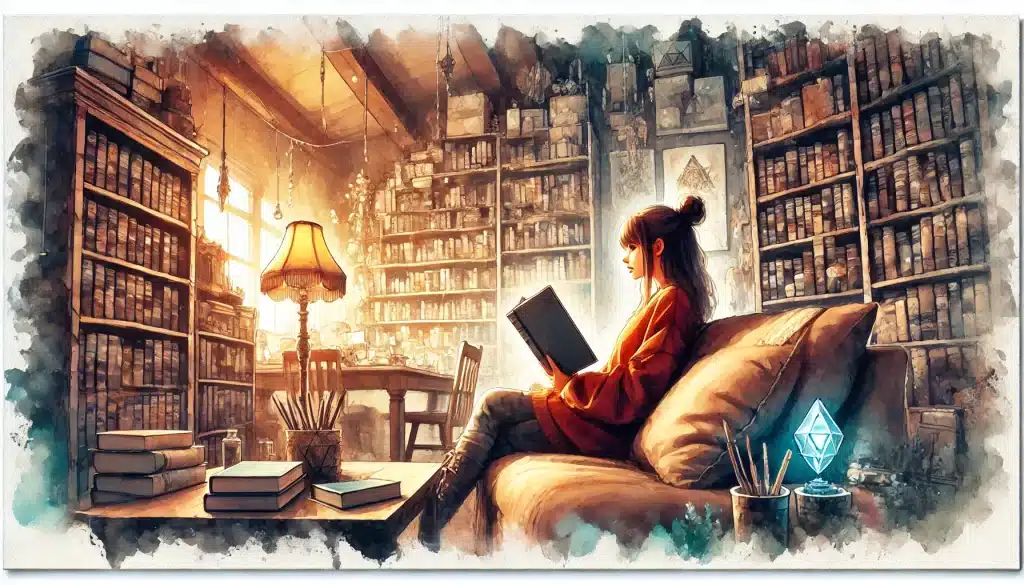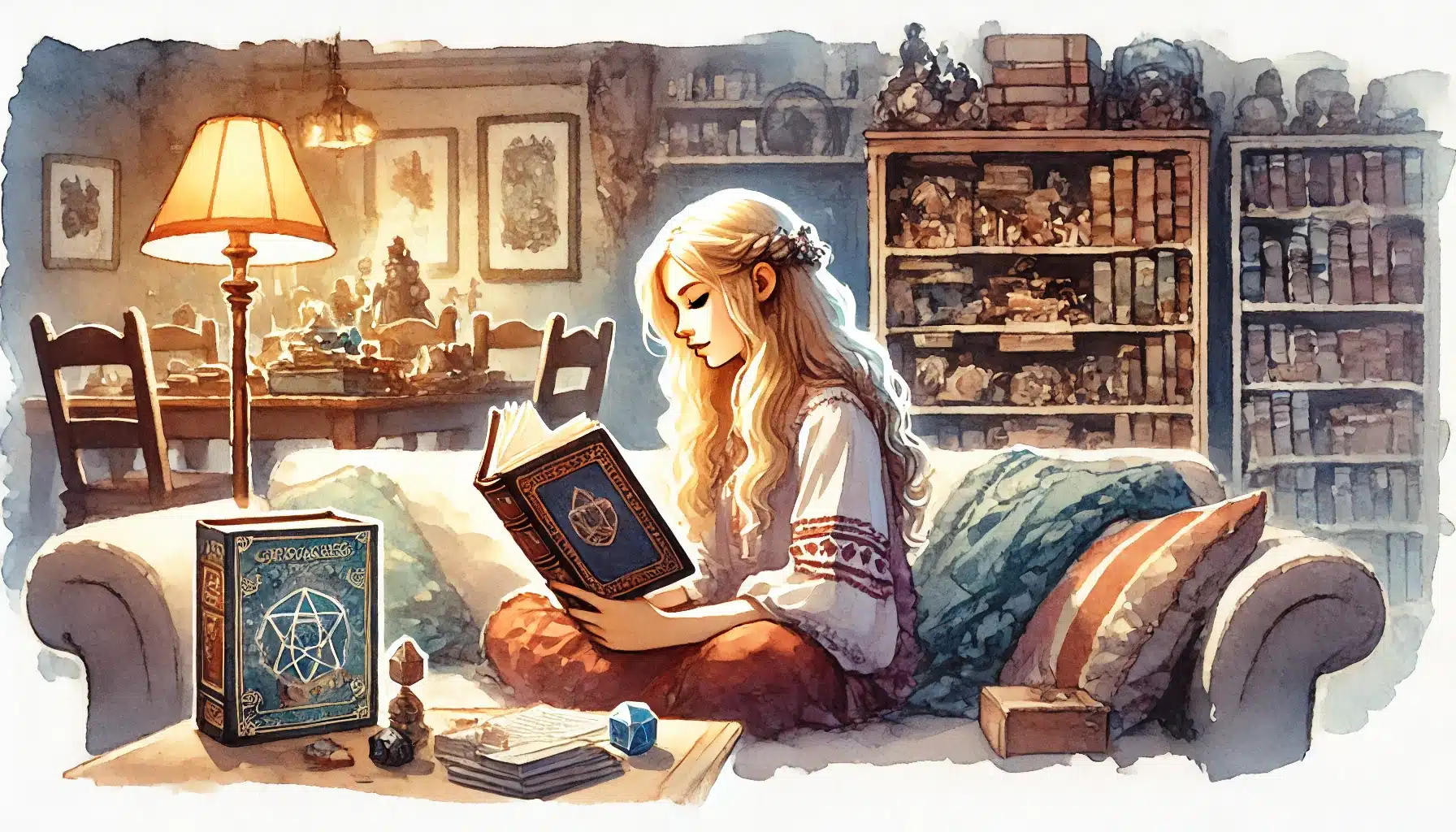Picture yourself in a dimly lit room, surrounded by friends, dice rolling across the table. The air buzzes with excitement as you embark on an epic adventure, guided by the pages of a well-worn book. This is the magic of tabletop role-playing games (RPGs), and it all starts with the right rulebook.
Remember, the best RPG books are more than just rules and stats. They’re gateways to new worlds, sparking imagination and creating unforgettable stories. Whether you’re a seasoned dungeon master or a curious newcomer, these classic RPG books have shaped the gaming landscape and inspire players.
Let’s dive into the tomes that have stood the test of time and left an indelible mark on the RPG community.
The Founding Fathers of Fantasy
No discussion of classic RPG books would be complete without paying homage to the games that started it all.
Dungeons & Dragons: Where It All Began
When Gary Gygax and Dave Arneson introduced Dungeons & Dragons (D&D) in 1974, they unknowingly sparked a revolution in gaming. The original D&D boxed set, with its three small booklets, laid the foundation for modern RPGs.
Fast forward to 1978, and the Advanced Dungeons & Dragons (AD&D) Player’s Handbook hit the shelves. This hardcover book, with its iconic blue cover featuring a demon idol, became the bible for fantasy role-playing. It expanded on the original concepts, offering a more structured and detailed system that would define the genre for years to come.
The Call of Cthulhu: Horror Meets Roleplaying
In 1981, Chaosium released Call of Cthulhu, based on H.P. Lovecraft’s cosmic horror stories. This game brought a new dimension to RPGs, focusing on investigation, sanity, and the terror of the unknown. Its innovative mechanics and rich, atmospheric setting have made it a perennial favorite among horror fans and storytellers alike.
Expanding Horizons: Beyond Fantasy
As the RPG hobby grew, so did the variety of games and settings available to players.
Traveller: Sci-Fi Adventures in the Far Future
Marc Miller’s Traveller, first published in 1977, took players from dungeons to the stars. This pioneering science fiction RPG offered a vast universe to explore, with rules for creating characters, starships, and entire solar systems. Its “lifepath” character creation system, where characters gain skills and experience before play begins, influenced many games that followed.
Vampire: The Masquerade – A Gothic Punk Revolution
The 1991 release of Vampire: The Masquerade by White Wolf Publishing marked a significant shift in RPG design and themes. This game thrust players into a world of modern gothic horror, where they played as vampires wrestling with their humanity. Vampire emphasized storytelling and personal horror, introducing the “Storyteller System” that prioritized narrative over complex rules.
Try my AI Tabletop RPG generators...and an extensive library of content!
The Evolution of Fantasy
While D&D laid the groundwork, other fantasy RPGs built upon and expanded the genre in exciting ways.
Warhammer Fantasy Roleplay: Grim and Perilous Adventures
Games Workshop’s Warhammer Fantasy Roleplay, first released in 1986, offered a darker, grittier take on fantasy roleplaying. Set in the Old World, a place of constant danger and moral ambiguity, this game stood out for its unique career system and its unflinching portrayal of a world where heroes are scarce and survival is never guaranteed.
Legend of the Five Rings: Eastern Fantasy with a Twist
Published in 1997 by Alderac Entertainment Group, Legend of the Five Rings (L5R) brought players into the world of Rokugan, a setting inspired by feudal Japan and other Asian cultures. L5R’s emphasis on honor, duty, and clan loyalty created a rich backdrop for roleplaying, while its innovative “roll and keep” dice system added a strategic element to conflict resolution.

Modern Classics: The New Wave
As we move into more recent times, several RPG books have already earned their place among the classics.
Fate Core: Narrative-Driven Flexibility
Evil Hat Productions released Fate Core in 2013, but its impact on the RPG scene has been profound. This system prioritizes narrative control and character-driven stories, using aspects and fate points to allow players to influence the game world. Fate Core’s flexibility has made it a popular choice for a wide range of settings and genres.
⚔️ Fantasy RPG Random Tables Books
Make life as a Gamemaster easier…
If you play Dungeons & Dragons, Pathfinder, or other fantasy RPGs, this
RPG random tables series
is packed with encounters, NPCs, treasure, and more. Available in eBook or print—either way, you’ll have a wealth of adventure ideas at your fingertips.
Blades in the Dark: Innovation in Action
John Harper’s Blades in the Dark, published in 2017, has quickly become a modern classic. Set in a dark, industrial fantasy city, this game innovates with its “fiction-first” approach and unique mechanics for heists and crew management. Its influence can already be seen in numerous other games, cementing its place in RPG history.
Why These Books Matter
- They shaped the hobby we love today
- Each introduced innovative mechanics or settings
- They continue to influence modern game design
- These books offer timeless adventures and inspiration
Whether you’re looking to explore the roots of the hobby or seeking inspiration for your next campaign, these classic RPG books offer a wealth of ideas, mechanics, and worlds to explore. They remind us that at its heart, roleplaying is about imagination, storytelling, and the joy of shared adventures.
Preserving the Legacy
As we celebrate these classic RPG books, it’s important to recognize their ongoing impact and ensure they’re preserved for future generations of gamers.
Digital Preservation and Accessibility
Many of these classic titles are now available in digital formats, making them more accessible than ever. PDF versions and print-on-demand options mean that even out-of-print gems can find their way into the hands of new players.
Learning from the Past
Game designers continue to draw inspiration from these classics, adapting and evolving their ideas for modern audiences. By studying these influential works, we gain insight into the evolution of game design and the enduring principles that make for engaging roleplaying experiences.
Remember, while these books are considered classics, the world of RPGs is vast and ever-growing. Don’t be afraid to explore beyond this list and discover the games that resonate with you and your group. Happy gaming!









